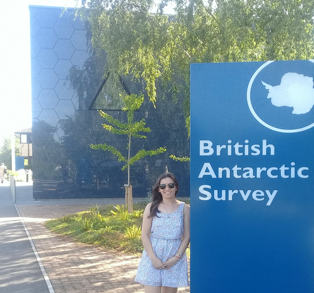Monitoring the invaive species T. maculipennis and its impact on King George Island
 Mónica Lujan Remedios-De León is a Doctoral Student at the Universidad de la República, in Montevideo, Uruguay. Her fellowship was hosted by the British Antarctic Survey in Cambridge, UK, where she worked with Professor Peter Convey and Dr. Kevin Hughes in July 2019.
Mónica Lujan Remedios-De León is a Doctoral Student at the Universidad de la República, in Montevideo, Uruguay. Her fellowship was hosted by the British Antarctic Survey in Cambridge, UK, where she worked with Professor Peter Convey and Dr. Kevin Hughes in July 2019.
Her project was titled “The non-native Diptera Trichocera (Saltrichocera) maculipennis Meigen, 1818 (Diptera: Trichoceridae) on King George Island: status, trajectories and options”.
Human activities increasingly contribute to the transfer and establishment of non-native species on the Antarctic continent and sub-Antarctic islands. The project investigated the impact of the non-native species Trichocera maculipennis (Trichoceridae) on King George Island. The aim was to create a draft management plan to minimise the risk and introduction of non-native species. First, a survey was carried out to document the knowledge about T. maculipennis in and around the different stations on King George Island. Pitfall traps and ‘sticky traps’ were then placed around the bases to document the local distribution of the species.
The collected data suggested that the species had spread beyond the confines of the stations on King George Island, making it essential to maintain regular monitoring as a tool to assess the population. By working alongside Prof. Peter Convey and Dr. Kevin Hughes, Mónica has gained valuabe insight into this important topic and plans to continue working on invasive species on the Antarctic continent.
Mónica shared the results of her study with students at her home institute and is planning to publish articles to present her results. She is currently developing a project at the Uruguayan Antarctic Institute (IAU), where she plans to implement the findings obtained during her Fellowship. Mónica says about the importance of her project and the SCAR Fellowship:
The realization of this work allowed me to see the damage that non-native species can cause in the Antarctic ecosystem and also to see the importance of environmental monitoring and the value of working together all the different scientific stations of the countries present in the Antarctic continent.
The full report is available here: Mónica Lujan Remedios-De León 2020 Fellowship Report and on the SCAR Fellows webpage together with the full list of previous SCAR Fellows and available reports.
The SCAR Early-Career Fellowship Programme is designed to encourage the active involvement of early career scientists and engineers in Antarctic scientific research, and to build new connections and further strengthen international capacity and cooperation in Antarctic research. The work must be carried out in a research group of a SCAR member country different from that of the applicant’s origin and current residence.
